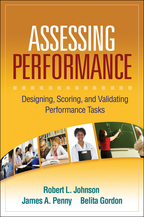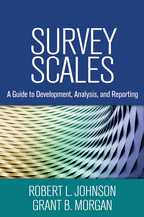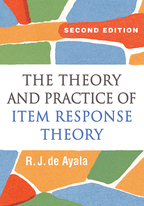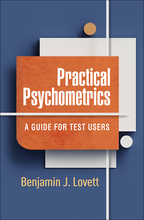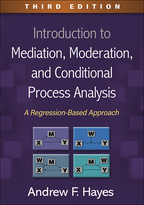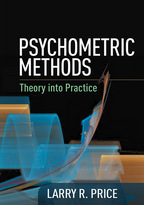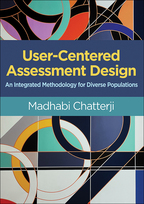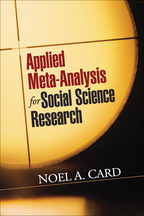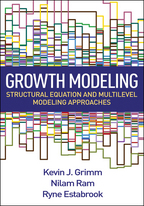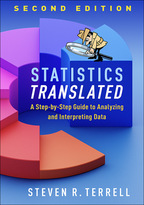Assessing Performance
Designing, Scoring, and Validating Performance Tasks
Robert L. Johnson, James A. Penny, and Belita Gordon
Paperbacke-bookprint + e-book
Paperback
orderOctober 10, 2008
ISBN 9781593859886
Price: $57.00355 Pages
Size: 6" x 9"
“Each chapter concludes with a short list of additional readings and a series of exercises, both of which contribute to the book's utility for instructional purposes. Supplementing each chapter is a checklist of issues to address in the course of developing and administering a performance test. These checklists are true gems. They not only serve as a chapter review, but also provide practitioners with tools to facilitate their work in applied settings....The book is well organized and the prose engaging, making it a pleasure to read....The numerous examples and checklists provide readers with many practical tools needed to develop their own performance assessments. The list of references alone will be of considerable value to many readers.”

—Journal of Educational Measurement
“Johnson, Penny, and Gordon have written the definitive book on assessing performance. Theory and practice are linked in this comprehensive, highly readable, well-written work. In clinical settings, this book can facilitate assessment and program evaluation to measure treatment outcomes and effectiveness. Destined to be a classic reference.”

—Ellen B. Braaten, PhD, Department of Psychiatry, Harvard Medical School
“As PI on a study in the NSF's Research and Evaluation on Education in Science and Engineering (REESE) program, I plan to use this book to guide our project’s validation process. The content is rich and accessible. Once I started reading, I couldn't put it down. I read it once straight through and am now going back and being more meticulous.”

—Ashley Ater Kranov, PhD, Director of Education, Innovation, and Assessment, Washington State University
“There is not a great deal on performance assessments in the traditional body of assessment literature. This meticulously researched book fosters a comprehensive understanding of this complex facet of assessment. The authors present a broad range of performance assessment models and examples that offer invaluable insight into the process of creating valid and reliable performance assessments. Through careful scaffolding, they lead the reader to greater proficiency in assessment design and implementation.”

—Molly Drake Shiffler, Department of Literacy and Language Development, School of Urban Initiatives, Cardinal Stritch University
“A welcome addition to the literature. This engaging and useful volume offers step-by-step guidance for planning, creating, using, and scoring performance assessments of all kinds. The main focus is on educational applications, but the many well-chosen examples are drawn from a surprisingly wide range of different fields. Beginners will find this book a comprehensive and accessible introduction to performance assessment. Seasoned test developers will find it a valuable resource, with useful checklists, guidelines, and nuts-and-bolts discussions of topics ranging from content standards to training raters, as well as pointers to the most up-to-date developments in the field. Statistical material is kept to a minimum, and is clearly presented, with detailed guidance on how to use widely available software to carry out all the analyses suggested. Study/discussion questions and suggestions for further reading at the end of each chapter, as well as the comprehensive glossary, all help to make this book an ideal text for a beginning graduate-level course. It would also be a valuable adjunct for a more advanced seminar.”

—Edward H. Haertel, Jacks Family Professor of Education, Stanford University
“Having worked on this topic for many years, I found this book the best one-stop shop for getting to know all the major issues and controversies in the field. It is a rare resource that gives you everything you need to get started with the design, administration, scoring, and psychometrics of performance assessments. The book comes from a well-practiced team of measurement experts whose rich experiences emerge on every page. A balance of practical and deeper analyses, it guides the reader through one of the most exciting transformations in measurement over the past two decades. The engaging, elegant writing style and concise yet substantive coverage make it a valuable text for graduate courses.”

—John Hattie, Faculty of Education, University of Auckland, New Zealand; Editor, International Journal of Testing
“Johnson et al. have crafted a detailed, accessible, and very useful book that features meaningful examples drawn from a variety of contexts, from statewide educational assessments to program evaluation to certification testing in the professions. The book makes transparent to readers the key steps in the development, implementation, and maintenance of a high-quality performance assessment system. I highly recommend this volume to practitioners, policy makers, and university instructors. Performance assessment has come of age, and this book showcases psychometrically and professionally defensible practices and approaches.”

—George Engelhard, Jr., Division of Educational Studies, Emory University
“An outstanding textbook and resource for anyone in the fields of education and licensure and certification. Providing comprehensive information on planning and implementing an assessment program that contains performance-based tasks, the book is loaded with exceptionally strong examples, models, and even to-do lists to aid in implementation. This superb book should be on every test and assessment specialist's bookshelf or desk—it certainly will be on mine!”

—Barbara Plake, Department of Educational Psychology (Emeritus), University of Nebraska-Lincoln
“This book fills a very important need in our field. As performance assessments increase in use, it is especially important to have a text like this one to provide guidance for thoughtful, systematic design and administration of this type of assessment. The frequent use of well-developed examples across practice areas is a definite strength. I also really like the to-do lists at the ends of the chapters!”

—J. Christine Harmes, Department of Graduate Psychology and Center for Assessment and Research, James Madison University
—Journal of Educational Measurement
“Johnson, Penny, and Gordon have written the definitive book on assessing performance. Theory and practice are linked in this comprehensive, highly readable, well-written work. In clinical settings, this book can facilitate assessment and program evaluation to measure treatment outcomes and effectiveness. Destined to be a classic reference.”
—Ellen B. Braaten, PhD, Department of Psychiatry, Harvard Medical School
“As PI on a study in the NSF's Research and Evaluation on Education in Science and Engineering (REESE) program, I plan to use this book to guide our project’s validation process. The content is rich and accessible. Once I started reading, I couldn't put it down. I read it once straight through and am now going back and being more meticulous.”
—Ashley Ater Kranov, PhD, Director of Education, Innovation, and Assessment, Washington State University
“There is not a great deal on performance assessments in the traditional body of assessment literature. This meticulously researched book fosters a comprehensive understanding of this complex facet of assessment. The authors present a broad range of performance assessment models and examples that offer invaluable insight into the process of creating valid and reliable performance assessments. Through careful scaffolding, they lead the reader to greater proficiency in assessment design and implementation.”
—Molly Drake Shiffler, Department of Literacy and Language Development, School of Urban Initiatives, Cardinal Stritch University
“A welcome addition to the literature. This engaging and useful volume offers step-by-step guidance for planning, creating, using, and scoring performance assessments of all kinds. The main focus is on educational applications, but the many well-chosen examples are drawn from a surprisingly wide range of different fields. Beginners will find this book a comprehensive and accessible introduction to performance assessment. Seasoned test developers will find it a valuable resource, with useful checklists, guidelines, and nuts-and-bolts discussions of topics ranging from content standards to training raters, as well as pointers to the most up-to-date developments in the field. Statistical material is kept to a minimum, and is clearly presented, with detailed guidance on how to use widely available software to carry out all the analyses suggested. Study/discussion questions and suggestions for further reading at the end of each chapter, as well as the comprehensive glossary, all help to make this book an ideal text for a beginning graduate-level course. It would also be a valuable adjunct for a more advanced seminar.”
—Edward H. Haertel, Jacks Family Professor of Education, Stanford University
“Having worked on this topic for many years, I found this book the best one-stop shop for getting to know all the major issues and controversies in the field. It is a rare resource that gives you everything you need to get started with the design, administration, scoring, and psychometrics of performance assessments. The book comes from a well-practiced team of measurement experts whose rich experiences emerge on every page. A balance of practical and deeper analyses, it guides the reader through one of the most exciting transformations in measurement over the past two decades. The engaging, elegant writing style and concise yet substantive coverage make it a valuable text for graduate courses.”
—John Hattie, Faculty of Education, University of Auckland, New Zealand; Editor, International Journal of Testing
“Johnson et al. have crafted a detailed, accessible, and very useful book that features meaningful examples drawn from a variety of contexts, from statewide educational assessments to program evaluation to certification testing in the professions. The book makes transparent to readers the key steps in the development, implementation, and maintenance of a high-quality performance assessment system. I highly recommend this volume to practitioners, policy makers, and university instructors. Performance assessment has come of age, and this book showcases psychometrically and professionally defensible practices and approaches.”
—George Engelhard, Jr., Division of Educational Studies, Emory University
“An outstanding textbook and resource for anyone in the fields of education and licensure and certification. Providing comprehensive information on planning and implementing an assessment program that contains performance-based tasks, the book is loaded with exceptionally strong examples, models, and even to-do lists to aid in implementation. This superb book should be on every test and assessment specialist's bookshelf or desk—it certainly will be on mine!”
—Barbara Plake, Department of Educational Psychology (Emeritus), University of Nebraska-Lincoln
“This book fills a very important need in our field. As performance assessments increase in use, it is especially important to have a text like this one to provide guidance for thoughtful, systematic design and administration of this type of assessment. The frequent use of well-developed examples across practice areas is a definite strength. I also really like the to-do lists at the ends of the chapters!”
—J. Christine Harmes, Department of Graduate Psychology and Center for Assessment and Research, James Madison University

